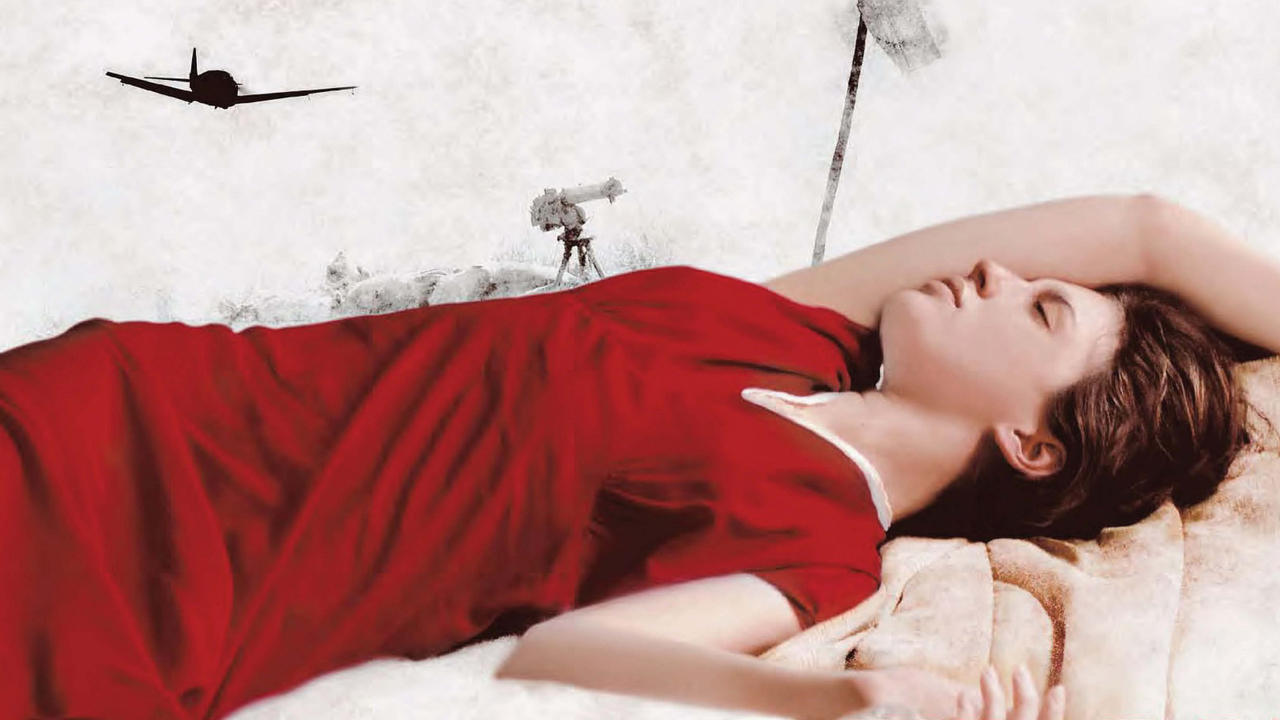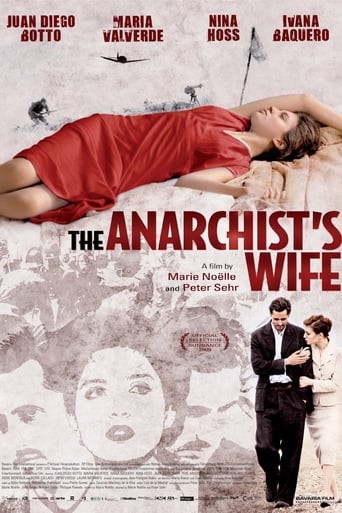Infamousta
brilliant actors, brilliant editing
Dorathen
Better Late Then Never
Lucia Ayala
It's simply great fun, a winsome film and an occasionally over-the-top luxury fantasy that never flags.
Guillelmina
The film's masterful storytelling did its job. The message was clear. No need to overdo.
ma-cortes
¨The Anarchist's Wife" or "La dona De l'Anarquista" is the thrilling tale of Manuela (Maria Valverde) who is left behind when her hubby named Justo (Juan Diego Botto) fights for his ideals against Franco's army during the uprising and subsequent war . Then , along the Spanish Civil War (1936-1936) Justo disappears . Years pass without a sad notice from him, but his wife never gives up hope of seeing him again . The story particularly concerning ¨The Siege of Madrid¨ , it was a three-year siege of the Spanish capital city of Madrid, during the Spanish Civil War of 1936 to 1939. The city, was besieged in October 1936 , as in a radio broadcast on the 18th, the communist leader Dolores Ibarruri coined the famous slogan ¡No Pasarán! ("They shall not pass"), urging resistance against the coup , the slogan was to become synonymous with the defence of Madrid and the Republican cause in general . Madrid was held by various forces loyal to the Second Spanish Republic and was besieged by Spanish Nationalist and allied troops under General Francisco Franco. The Battle of Madrid in November 1936 was the most concentrated fighting in the city, when the Nationalists made their most determined attempt to take Madrid . Thereafter and for the remainder of the war, Madrid was held by the Republicans. However, its population contained a significant number of right-wing sympathisers. Over 20,000 right-wingers sought refuge in foreign embassies in the city. The weeks that followed the July uprising, saw a number of fascists, or Nacionalist sympathisers , as the left termed them , being killed in Madrid by Republicans. Madrid eventually fell to the Nationalists on 28 March 1939 . This is an interesting flick dealing with historical events as well as a passionate retelling and a touching warlike drama . "La Mujer Del Anarquista¨, being adapted by the same director Marie Noelle from her own story and dialogs written by Ray Loriga . This moving as well as strong story is an emotive recounting and a stirring melodrama , including tragedies , deaths and executions . This flick has some powerful , rousing images as when a crowded Republican militia is surrounded in prison while their family people shouting as well as Francoists , Falangistas armies arrive in Madrid and carry out rampage , firing , shooting and destruction . "The Anarchist's Wife" results to be other of the uncountable stories to deal with dramatic deeds regarding the Civil War background , including a lot of stock footage . A familiar theme about the global horrors of a fratricide war , impossible to forget to Spanish Cinema , as the picture gives a deep detail about the upheaval as called ¨Holy Crusade¨ and atrocities being committed by Fascists in behalf of the Francoist army . Maria Noelle also writes the script and being filmed in his usual formal and stylistic scholarship , without leaving a trace the thought-provoking issues , in terms of dramatic and narrative excitement . The main problem has to face "La Mujer del Anarquista" , beyond not being able to avoid falling into the politic pamphlet is precisely derived from the coldness of its staging, which eventually become monotonous over 112 minutes of footage . This is a Spain/France/Germany enough budget co-production and obtained limited success in the Spaniard box office . Excellent main cast forming an enjoyable human group of players and giving excellent interpretations such as Juan Diego Botto as a Republican lawyer soldier with deep idealist thought who is deported to a concentration camp, and upon his release, continues the fight against nationalism in the French resistance and Maria Valverde as his beloved wife who attempts to live with his two children when his husband is disappeared . Very good support cast formed by various Spanish and other European actors such as Ivana Baquero as Paloma , Nina Hoss as Lenin , Jean-Marc Barr as Pierre , Adrià Collado as Francisco ,Laura Morante as Lucienne ,Irene Montalà as Pilar , Biel Duran and Irene Visedo .Sensitive as well as evocative musical score by Jean Francois Robin . Including a spotless pictorial photography by Zacarias De La Riva . Cameraman Zacarias is deemed to be one of the best Spanish photographers with a long artistic career . He has photographed hits such as : Automat , The machinist , Hierro , Tadeo Jones and El Cid : the legend . He carries out a splendid cinematography in juicy atmosphere , being filmed on location in Alsasua , Pamplona , Barcelona, Catalonia, Madrid, Spain Cerbère, Pyrénées-Orientales, Annonay, Ardèche, France and Cologne, North Rhine-Westphalia, Germany . The motion picture was compellingly written ,produced and directed by Marie Noelle and Peter Sehr , though it has some flaws and gaps and results to be overlong . .
Armand
Spanish Civil War. drama of a family. war of a woman in search of her husband. delicate - precise music. bricks for better image of a page from history. a beautiful film ingredients. but it is not enough. my impression - a story without borders. too many details, too sentimental, almost unrealistic. it is not the error of director; only mine. but it is first step to desire to love this large, strange, honest film. because the performance is well, few scenes are lovely but all seems be a cage of lovely bird. so, it is necessary to see it ! maybe, for not forgive a moment of recent history. to discover a gentle drama. to live emotions of a crumb from ordinary reality.
gradyharp
Few films have dealt with the Spanish Civil War as well ad THE ANARCHIST'S WIFE (La Mujer Del Anarquista), written by Ray Loriga and co-director (with Peter Sehr) Marie Noelle. It is a film that shows all aspects of the brutal madness of war, focusing more on the affect that war has on families than merely showing battlegrounds. Combining luxuriously colorful cinematography with archival black and white film clips, this film for once allows the audience to see the inside picture of what happened in Spain of this period. It is1937 and idealistic radio commentator Justo (the very fine Argentine actor Juan Diego Botto) is committed to the overthrow of Generalissimo Franco as well as being opposed to the outside forces of Hitler and Mussolini that threaten the social justice of his beloved Spain. He is married to the beautiful and loving Manuela (Maria Valverde) and they have a child Paloma. As the tension in Spain builds Justo is captured by Franco's government, members of his family are killed, and despite Manuela's desire to be with her husband she also feels compelled to stay in Spain with her daughter and soon to be born son. Justo is shipped away, spends time in a concentration camp and upon release fights with the French Resistance, only to be sent form prison to prison throughout the duration of the Spanish Civil War and World War II. Manuela continues to believe in Justo's welfare and despite the many years of separation she never stops believing he will return. Many problems arise for Manuela - her home is taken over by the government, she must beg for food, her son dies, and Paloma watches the little family being deserted by the father she no longer remembers. Ultimately Justo returns after many years, but the war and prisons have changed him. The story seeks to demonstrate how difficult it is for families to survive intact in time of war. The story is well told, clarifying many facts of the time that history has altered. The cast is very large and is uniformly excellent. In addition to Botto and Valverde, Irene Visedo, Ivana Baquero, Nina Hoss, Jean-Marc Barr, Laura Morante, Irene Montalà, Adrià Collado, Biel Durán, and Pere Arquillué provide strong supporting roles. The musical score by Zacarias M. de la Riva adds immensely to the changing atmospheres of this period piece Highly Recommended. Grady Harp
donjokat-kat
I came into watching this film with relatively high expectations, but it succeeded in exceeding them! It is an incredible film, with an interesting and heartbreaking story, wonderful performances (I especially enjoyed seeing the talented young Banquero again), and an excellent evocation of the Spanish Civil War that is a little more balanced (as far as showing atrocities on both sides instead of just one) than most. The interesting use of old archived footage interspersed with dramatized scenes added to the war atmosphere. But while it is something of a historical/war drama, the main heart is the enduring love between the anarchist of the title and his wife, that survives time, distance, tragedy, and the horrors of war--it is really a family drama and love story set in the Spanish Civil War more than a movie about the war itself.In any case, it is well worth seeing, for both the story and the performances, if you have the chance. The musical score was lovely as well.

